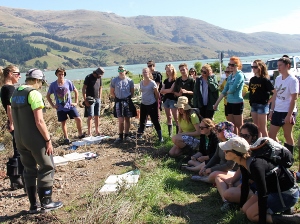
Akaroa Area School student Moses Bygate Smith (15) said the youth hui was an invaluable experience and something more students should get involved with. “Before we came to the Koukourarata for the hui I was particularly interested in the local culture and history of the area and we were able to learn some really fascinating stuff about these things. As the hui went on, the scientific and environmental aspects of water and land management really took my interest, and we all particularly enjoyed the practical exercises we undertook such as analysing a water sample,” Moses said. “I wasn’t really that aware of the challenges facing the local environment and how challenging it is to balance biodiversity considerations with economic and cultural ones so the experience was a real eye-opener. I’m really keen to play a more active role in local water management and think more young people should be involved in these kinds of events. I will definitely be telling my friends and classmates about what I have learnt over the past few days, and how they can get involved,” he said.
On the first day of the hui, participants were welcomed on to Koukourarata Marae in Port Levy where they stayed for three nights and got to learn about the history and culture of the area. Over the next few days the students looked at many land and freshwater issues including land-use, water quality and quantity, the impact of development on the environment, and biodiversity values.
The youth hui also included some hands-on practical exercises such as water-quality testing, riparian planting, and surveying the coastal environment. At the conclusion of the hui students were also required to present their insights and visions for water management in the future back to the group.
Zone committee chair Richard Simpson said the opportunity to get young people involved in local water-management decisions was invaluable. “We were very impressed with the attitude and interest shown by the participants at the hui. As a zone committee it is our job to work with locals to make effective water management decisions and young people are an important part of the community so it is vital their views are captured. “We look forward to seeing some of these students playing a leadership role in local water management over the coming years,” he said.
The Banks Peninsula youth hui is the third to be held across the 10 CWMS zones. Local government and regional authorities are bound by the United Nations Convention on the Rights of the Child to provide civil, political, economic, social and cultural rights to all children and young people.
Sian Carvell, Environment Canterbury youth engagement team leader, said the goals and values of the Canterbury Water Management Strategy (CWMS) require young people to be involved. “The vision of the CWMS is to enable present and future generations the greatest social, economic, recreational and cultural benefits from our water resources within an environmentally sustainable framework.”
Much of the work being done by each of Canterbury’s 10 zone committees on improving local water management will benefit our children and their children. For this reason it is vital we get young people involved in the process now and ensure they have the information and the interest to contribute. “By doing this now we can ensure their views are captured while also building capacity as Canterbury works towards achieving the water management targets in the CWMS,” she said.
The 17 students came from Cashmere High School, Hilmorton High School, Akaroa Area School, Diamond Harbour School, CPIT and Canterbury University.
The much-delayed English draft curriculum is now out for consultation, generating discussion from teachers.
Research from AUT demonstrates arts, culture and recreation have positive impacts on all aspects of…
How effective has the school phone ban been in achieving its aims? Researchers from the…
School camps and excursions deliver hands on learning experiences, helping to consolidate classroom learning.
Innovations in AV technologies present new opportunities to engage with students. We look at how…
A new report from the University of Auckland’s Our Voices Project asks young people what…
This website uses cookies.